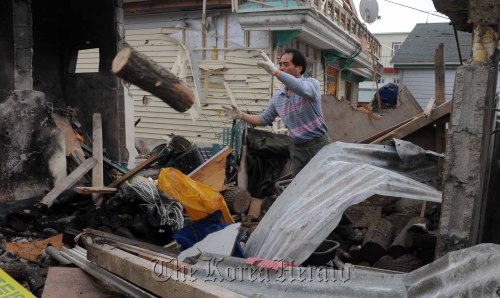Press Release
Anxiety over security has reached record-high levels after the recent artillery attack by North Korea, a nationwide survey found Thursday.
In the survey conducted on Nov. 27 after the North’s deadly shelling of Yeonpyeong Island on Nov. 23, 81.5 percent of the 800 respondents said they were unnerved about the country’s current security.
The figure is the highest since 2000 when the East Asia Institute, an independent think tank, began a similar survey.
In the 2000 survey following the first historic inter-Korean summit, 18.9 percent of people surveyed said they felt uneasy about security.
Over the past 10 years, the figure has moved up and down, corresponding with important events such as North Korea’s nuclear tests and developments in the six-party talks, the institute said.

Until the early days of the current Lee Myung-bak administration, anxiety over security remained at 29.5 percent in March 2009.
However, starting with the North’s long-range missile tests in April 2009, tensions between the two Koreas have increased.
The international community moved to impose sanctions against the North as part of the U.S.-led Proliferation Security Initiative in June 2009.
One month later, a South Korean tourist was shot dead by a North Korean soldier at the Mount Geumgang resort.
In April this year when the government officially concluded that North Korea torpedoed the navy vessel Cheonan, claiming the lives of 46 sailors, people’s anxiety soared, with 75.4 percent saying they felt uneasiness.
“The recent shelling of Yeonpyeong Island targeted directly the South’s territory and civilians under the armistice which ended the 1950-53 Korean War,” the institute said in its analysis report.
“People are angry about the fact that the basic principle of the international law, which bans attacking civilians and their property, was broken during military conflicts for the first time.”
Despite the growing concerns, only 26.8 percent of the respondents said that the current tension could escalate to a full-scale war between the North and the South.
A disparity between genders was apparent, with 35.4 percent of female respondents predicting an all-out war, almost double that of the 18 percent of men.
Youngsters also showed a higher expectation of war than older age groups.
Asked about the government’s response to the North Korean attack, 72 percent of the respondents responded negatively regardless of their political views.
Respondents evaluated positively the “early message from President Lee (21.8 percent)” who moved to prevent a full-scale war, “the stronger alliance with the U.S. (16.5 percent)” and “military response (9.5 percent).”
They pointed out the “lack of crisis management system (36.5 percent)” as the most urgent issue to improve, followed by “lukewarm military response (23.8 percent)” and the “government’s inconsistent policy toward the North (13.1 percent).”
“In a series of security uncertainties over the years, people surveyed preferred international cooperation (75 percent) or financial sanctions (58.5 percent) as the government’s response to North Korean provocations. Opinions were mixed about breaking off the relationship with the North (45.2 percent), and some were reluctant for military action to be taken (28.2 percent),” the institute said.
“However, after the Yeonpyeong shelling, those who called for a limited military response soared to 68.6 percent, with no apparent changes found for other preventive measures.”